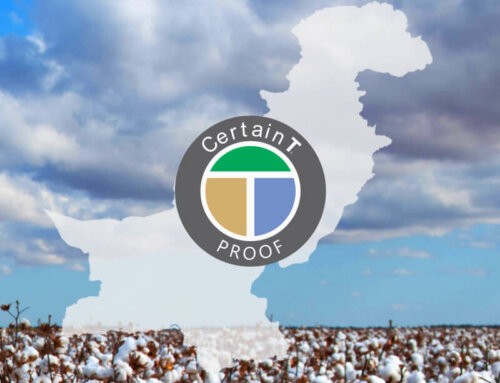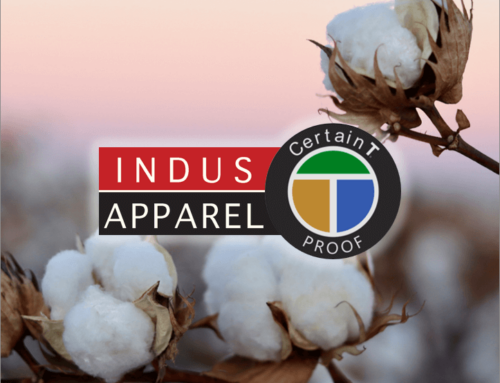

Farm the Cotton
The cotton is grown and picked in pristine California farmland, family owned and operated for generations. After harvesting, the Pima seed-cotton modules are transported to a nearby cotton gin.

Gin the Cotton
Once the Pima cotton arrives at the gin, seeds (and other impurities) are separated from the cotton fiber.

Tag/Spray with SigNature® T
At the end of this process, SigNature® T DNA, a unique molecular tag, is applied through a fine misting process. This tag attaches to the fiber at a cotton-to-marker ratio of 1:1 billion. The tenacity of the tag ensures a reliable, secure tracking system throughout the entire manufacturing process, beginning in the U.S., and through the spinning, weaving and sewing stage overseas.

Bale Cotton
Harvested, ginned and tagged, the Pima cotton is then compacted into 500-
pound bales that are barcoded and tracked by PimaCott to prevent product tampering.

Test Fiber
The first check of the Pima cotton fibers happens at the gin. PimaCott submits the bales for testing, looking for the unique SigNature® T DNA marker. The merchant then receives the bales from the ginner together with test results, the bale ID numbers, and USDA grading certification.

Export
The bales of Pima cotton start their journey overseas for the next stage of product manufacturing.

Spin into Yarn
Spinners receive and separately store the Pima cotton bales and then spin the raw cotton fibers into yarn on dedicated lines.

Test Yarn
After spinning fiber into yarn, PimaCott once again tests the yarns for the SigNature T marker, to ensure that no cotton blending has taken place. These tests are done before the yarns are permitted to move to the weavers.

Weave or Knit into Fabric
The pure Pima cotton yarns finally take shape as they are woven or knitted into fabric to be used in various textile or apparel products.

Test Fabric
Guaranteeing purity, the freshly woven fabric is once again tested by PimaCott for the SigNature T marker to verify that the fabrics contain only tagged Pima cotton.

Cut & Sew into Linen/Clothes
After passing the purity test, the Pima cotton fabric is then cut and sewn into finished home textile or apparel products.

Test Finished Product
PimaCott does a final test of the finished products prior to the product being shipped back to the United States. Specifically, PimaCott looks for the SigNature T DNA markers that have remained detectable, even after many complex manufacturing processes.

Import
Having passed the final purity test, the finished, pure Pima cotton products are shipped and tracked with a pedigree document back to the United States.

Retail
The finished goods, labeled with the PimaCott trademark, arrive at retail where consumers, driven by a desire for a quality and purity, can be assured of the integrity of their purchase.
Enjoy





